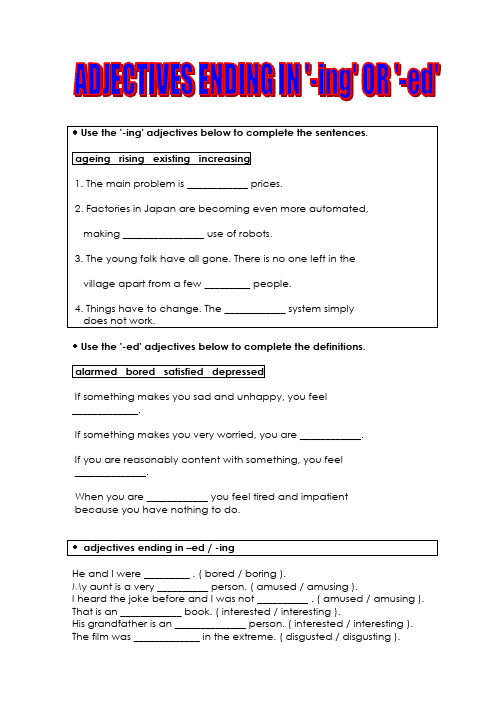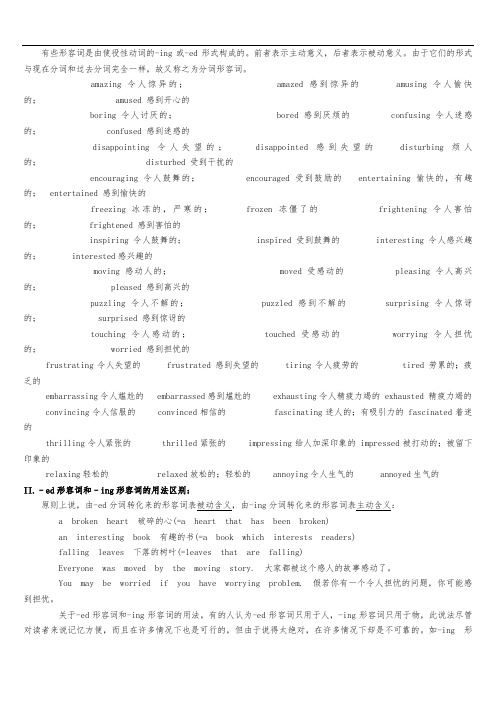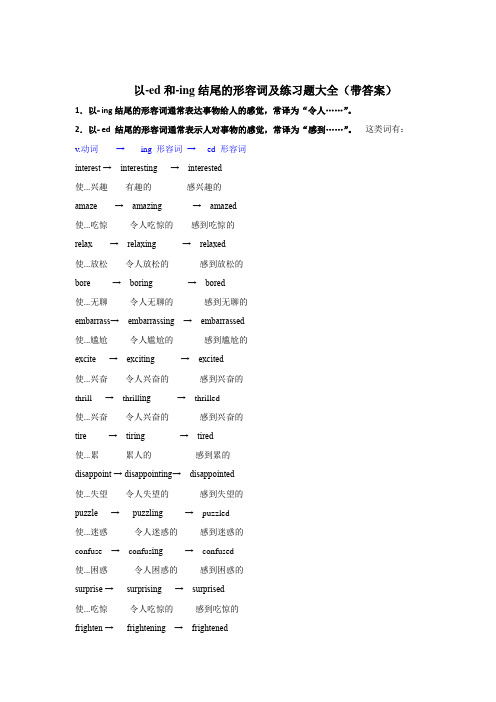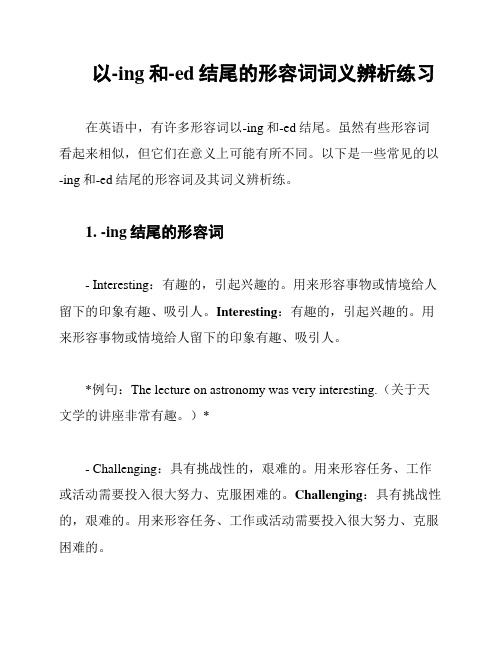以-ing和-ed结尾的形容词练习
ed形容词和ing形容词练习

ed形容词和ing形容词练习引言形容词在英语中起着非常重要的作用,它们能够帮助我们更加准确地描述事物,使我们的语言更加生动有力。
在英语中,形容词主要有两种形式,一种是以-ed结尾的形容词,称为过去分词形容词,另一种是以-ing结尾的形容词,称为现在分词形容词。
这两种形容词的用法不同,因此需要加以区分。
本文将从以下几个方面介绍两种形容词的用法和区别:形成规则、词义、修饰范围等。
并提供一些练习题供读者练习。
形成规则以-ed结尾的形容词大多数是以动词过去式+ed构成的,例如:- bored(无聊的)--->bore(使……无聊)的过去式+ed;- confused(困惑的)--->confuse(使……困惑)的过去式+ed;- interested(感兴趣的)--->interest(使……感兴趣)的过去式+ed;- surprised(惊讶的)--->surprise(使……惊讶)的过去式+ed。
- charming(迷人的)--->charm(迷住)+ing;- interesting(有趣的)--->interest(感兴趣)+ing;- exciting(令人激动的)--->excite(激动)+ing;- relaxing(令人放松的)--->relax(放松)+ing。
此外,也有少数以其他形式结尾的-ed和-ing形容词。
例如,以-ful结尾的形容词,如:beautiful(美丽的)、useful(有用的)、colorful(多彩的)等。
以-less结尾的形容词,如:useless(无用的)、hopeless(绝望的)、heartless(无情的)。
以-ive结尾的形容词,如:active(积极的)、creative(有创造力的)、attractive(有吸引力的)。
以-y结尾的形容词,如:happy(快乐的)、lucky(幸运的)、easy(容易的)等。
高中英语--ed和ing结尾的形容词练习

Use the '-ing' adjectives below to complete the sentences.ageing rising existing increasing1. The main problem is ____________ prices.2. Factories in Japan are becoming even more automated,making ________________ use of robots.3. The young folk have all gone. There is no one left in thevillage apart from a few _________ people.4. Things have to change. The ____________ system simplydoes not work.Use the '-ed' adjectives below to complete the definitions.alarmed bored satisfied depressedIf something makes you sad and unhappy, you feel_____________.If something makes you very worried, you are ____________.If you are reasonably content with something, you feel______________.When you are ____________ you feel tired and impatientbecause you have nothing to do.adjectives ending in –ed / -ingHe and I were _________ . ( bored / boring ).My aunt is a very __________ person. ( amused / amusing ).I heard the joke before and I was not __________ . ( amused / amusing ). That is an ____________ book. ( interested / interesting ).His grandfather is an ______________ person. ( interested / interesting ). The film was _____________ in the extreme. ( disgusted / disgusting ).She was ____________ by the film last night . ( disgusted / disgusting ).The traffic jam was very ____________ indeed. ( irritated / irritating ).He was very ____________ by the traffic jam. ( irritated / irritating ).The situation was very _____________ . ( frightened / frightening ).I was very _____________ by the strange knock on the door. ( frightened / frightening ).She was very ___________ because of the delay. ( annoyed / annoying ). It is very _____________ when you have to wait so long. ( annoyed / annoying ).Complete the sentences with one of the words in the box. Careful! They are not all used.Surprised interesting interested surprising annoyed bored boring frightened annoying exciting frighteningexcited tiring worried tired worryinga. The TV programme was _________________ so I turned it off.b. Children can’t get to sleep on Christmas Eve. They’re too _______________.c. “Hi, Mum!”.“Carol! Thank goodness you rang! Where have you been? We’ve been so ___________________ about you!”.d. “Hello, darling. I’ve got a present for you”.“For me?”“Don’t look so __________________. I often buy you presents”“But it isn’t my birthday!”e. The art exhibition was very __________________. I loved it, but I had to leave after three hours. My feet were killing me! I find going around art galleries and museums very _________________.f. Some people don’t go out at night because they’re __________________ that someone will rob them.g. Our financial situation is very __________________. We spend more and more, but we’re earning less and less.h. “You’re yawning. Are you listening to what I’m saying?”“I am! I’m really _______________. I want to know what happened. It’s just that I feel very ______________. I went to bed very late last night”.i. “I’m going to a three-month holiday to the Far East”.“ How ________________. Lucky you!”.j. “Was your father __________________when you told him your exam results?”“He was furious”.。
以-ing和-ed结尾的形容词

有些形容词是由使役性动词的-ing或-ed形式构成的。
前者表示主动意义,后者表示被动意义。
由于它们的形式与现在分词和过去分词完全一样,故又称之为分词形容词。
amazing令人惊异的;amazed 感到惊异的amusing 令人愉快的;amused 感到开心的boring令人讨厌的; bored感到厌烦的 confusing令人迷惑的; confused 感到迷惑的disappointing令人失望的;disappointed 感到失望的disturbing烦人的; disturbed 受到干扰的encouraging令人鼓舞的;encouraged 受到鼓励的 entertaining愉快的,有趣的;entertained 感到愉快的freezing 冰冻的,严寒的;frozen 冻僵了的frightening 令人害怕的;frightened 感到害怕的inspiring 令人鼓舞的; inspired受到鼓舞的 interesting 令人感兴趣的; interested感兴趣的moving 感动人的; moved 受感动的 pleasing 令人高兴的; pleased 感到高兴的puzzling 令人不解的;puzzled 感到不解的surprising 令人惊讶的;surprised 感到惊讶的touching 令人感动的;touched 受感动的worrying令人担忧的; worried 感到担忧的frustrating令人失望的 frustrated 感到失望的 tiring令人疲劳的 tired 劳累的;疲乏的embarrassing令人尴尬的 embarrassed感到尴尬的 exhausting令人精疲力竭的 exhausted 精疲力竭的 convincing令人信服的 convinced相信的 fascinating迷人的;有吸引力的 fascinated着迷的thrilling令人紧张的 thrilled紧张的 impressing给人加深印象的 impressed被打动的;被留下印象的relaxing轻松的 relaxed放松的;轻松的 annoying令人生气的 annoyed生气的II.–ed形容词和–ing形容词的用法区别:原则上说,由-ed分词转化来的形容词表被动含义,由-ing分词转化来的形容词表主动含义:a broken heart 破碎的心(=a heart that has been broken)an interesting book 有趣的书(=a book which interests readers)falling leaves 下落的树叶(=leaves that are falling)Everyone was moved by the moving story. 大家都被这个感人的故事感动了。
以-ed, -ing结尾的形容词 初中

以-ed, -ing结尾的形容词初中1. bored (无聊的) - feeling weary and uninterested due to lack of stimulationExample sentence: I am bored because there is no new movie to watch tonight. (由于今晚没有新电影可以看,我感到无聊。
)2. excited (兴奋的) - feeling joy or anticipation about something that is about to happenExample sentence: I am excited about going on a vacation next week. (我对下周的度假感到兴奋。
)3. tired (疲倦的) - feeling drained of energy or worn outExample sentence: After a long day of hiking, I am really tired. (长时间的徒步旅行后,我真的很累。
)4. annoying (恼人的) - causing irritation or frustrationExample sentence: My little brother can be so annoying when he keeps asking the same question repeatedly. (当我弟弟反复问同一个问题时,真是令人恼火。
)5. interesting (有趣的) - arousing curiosity or attentionExample sentence: The documentary we watched last night was really interesting. (昨晚我们看的纪录片真有趣。
高中英语一轮复习---以-ed和-ing结尾的形容词和练习题大全(带答案)

以-ed和-ing结尾的形容词及练习题大全(带答案)1.以ing结尾的形容词通常表达事物给人的感觉,常译为“令人……”。
2.以ed 结尾的形容词通常表示人对事物的感觉,常译为“感到……”。
这类词有:v.动词→ -ing 形容词→ -ed 形容词interest → interesting → interested使...兴趣有趣的感兴趣的amaze → amazing → amazed使...吃惊令人吃惊的感到吃惊的relax → relaxing → relaxed使...放松令人放松的感到放松的bore → boring → bored使...无聊令人无聊的感到无聊的embarrass→ embarrassing → embarrassed使...尴尬令人尴尬的感到尴尬的excite → exciting → excited使...兴奋令人兴奋的感到兴奋的thrill → thrill ing → thrilled使...兴奋令人兴奋的感到兴奋的tire → tiring → tired使...累累人的感到累的disappoint → disappointing→ disappointed使...失望令人失望的感到失望的puzzle → puzzling → puzzled使...迷惑令人迷惑的感到迷惑的confuse → confus ing → confused使...困惑令人困惑的感到困惑的surprise → surprising → surprised使...吃惊令人吃惊的感到吃惊的frighten → frightening → frightened使...害怕令人害怕的感到害怕的terrify → terrifying → terrified恐吓/吓唬令人恐惧的感到恐惧的satisfy → satisfying → satisfied使...满意令人满意的感到满意的please → pleas ing → pleased使...高兴令人愉快的感到高兴的/满意的amus e → am us ing → am used使...欢乐逗人笑的感到逗乐的astonish → astonishing → astonished使...惊讶令人惊讶的感到惊讶的shock→ shocking → shocked使...震惊令人震惊的感到震惊的annoy → annoying → annoyed使...烦恼令人烦的感到恼怒的move → moving → moved移动令人感动的感动的disappoint→ disappointing → disappointed使...失望令人失望的感到失望的threaten→ threatening → threatened恐吓/威胁胁迫的收到威胁的worry→worrying → worried使...担心令人担心的感到担心的练习题一,用所给词的适当形式填空1.This is an book, and I’m in it. (interest)2.Seeing the result, we are all .(disappoint).3.The (surprise) loo k on his face suggested that he hadn’t expected that.4.这匹受到惊吓的马开始跑起来。
以ing和ed结尾的形容词完整版

以i n g和e d结尾的形容词Document serial number【NL89WT-NY98YT-NC8CB-NNUUT-NUT108】I.高中英语中以-i n g和-e d结尾的形容词有些形容词是由使役性动词的-ing或-ed形式构成的。
前者表示主动意义,后者表示被动意义。
由于它们的形式与现在分词和过去分词完全一样,故又称之为分词形容词。
amazing令人惊异的;amazed感到惊异的amusing令人愉快的;amused感到开心的boring令人讨厌的;bored感到厌烦的confusing令人迷惑的;confused感到迷惑的disappointing令人失望的;disappointed感到失望的disturbing烦人的;disturbed受到干扰的encouraging令人鼓舞的;encouraged受到鼓励的entertaining愉快的,有趣的;entertained感到愉快的freezing冰冻的,严寒的;frozen冻僵了的frightening令人害怕的;frightened感到害怕的inspiring令人鼓舞的;inspired受到鼓舞的interesting令人感兴趣的;interested感兴趣的moving感动人的;moved受感动的pleasing令人高兴的;pleased感到高兴的puzzling令人不解的;puzzled感到不解的surprising令人惊讶的;surprised感到惊讶的touching令人感动的;touched受感动的worrying令人担忧的;worried感到担忧的frustrating令人失望的frustrated感到失望的tiring令人疲劳的tired劳累的;疲乏的embarrassing令人尴尬的embarrassed感到尴尬的exhausting令人精疲力竭的exhausted精疲力竭的convincing令人信服的convinced相信的fascinating迷人的;有吸引力的fascinated着迷的thrilling令人紧张的thrilled紧张的impressing给人加深印象的impressed被打动的;被留下印象的relaxing轻松的relaxed放松的;轻松的annoying令人生气的annoyed生气的II.–ed形容词和–ing形容词的用法区别:原则上说,由-ed分词转化来的形容词表被动含义,由-ing分词转化来的形容词表主动含义:abrokenheart破碎的心(=aheartthathasbeenbroken) aninterestingbook有趣的书(=abookwhichinterestsreaders)fallingleaves下落的树叶(=leavesthatarefalling)Everyonewasmovedbythemovingstory.大家都被这个感人的故事感动了。
以-ing和-ed结尾的形容词搭配练习

以-ing和-ed结尾的形容词搭配练习本文档旨在提供关于以-ing和-ed结尾的形容词搭配的练。
以下是一些常见的例子和联系问题。
-ing形容词的用法1. 请填写下列句子中空格处需要使用以-ing结尾的形容词。
- The movie was __________ (boring) and I ___ it.- She looked __________ (stunning) in her new dress.- The children were __________ (exciting) to go to the amusement park.2. 请将以下名词转换为以-ing结尾的形容词并填入空格中。
- danger: __________- interest: __________- amuse: __________- relax: __________-ed形容词的用法1. 请填写下列句子中空格处需要使用以-ed结尾的形容词。
- The news was __________ (unexpected) ___ surprise.- The meal was __________ (us) and I ___.- After the long hike, I felt __________ (exhausted) but satisfied.2. 请将以下名词转换为以-ed结尾的形容词并填入空格中。
- amaze: __________- inspire: __________- interest: __________- disappoint: __________总结本文档提供了以-ing和-ed结尾的形容词的练习。
通过填写空格,并结合相应的名词转换,您可以巩固对这些形容词的理解和正确用法。
希望这些练习对您的英语学习有所帮助!。
以-ing和-ed结尾的形容词词义辨析练习

以-ing和-ed结尾的形容词词义辨析练习在英语中,有许多形容词以-ing和-ed结尾。
虽然有些形容词看起来相似,但它们在意义上可能有所不同。
以下是一些常见的以-ing和-ed结尾的形容词及其词义辨析练。
1. -ing结尾的形容词- Interesting:有趣的,引起兴趣的。
用来形容事物或情境给人留下的印象有趣、吸引人。
Interesting:有趣的,引起兴趣的。
用来形容事物或情境给人留下的印象有趣、吸引人。
*例句:The lecture on astronomy was very interesting.(关于天文学的讲座非常有趣。
)*- Challenging:具有挑战性的,艰难的。
用来形容任务、工作或活动需要投入很大努力、克服困难的。
Challenging:具有挑战性的,艰难的。
用来形容任务、工作或活动需要投入很大努力、克服困难的。
*例句:Running a marathon is a challenging experience.(参加马拉松是一次具有挑战性的经历。
)*- Exciting:令人兴奋的,激动人心的。
用来形容引起强烈兴奋、激动的事物或情景。
Exciting:令人兴奋的,激动人心的。
用来形容引起强烈兴奋、激动的事物或情景。
*例句:The roller coaster ride was very exciting.(坐过山车很令人兴奋。
)*2. -ed结尾的形容词- Bored:感到厌烦的,无聊的。
用来形容因缺乏刺激、无聊而感到厌烦的状态。
Bored:感到厌烦的,无聊的。
用来形容因缺乏刺激、无聊而感到厌烦的状态。
*例句:She felt bored during the long lecture.(她在长时间的讲座中感到很无聊。
)*- Pleased:感到高兴的,满意的。
用来形容因某种原因而感到高兴、满意的情绪。
Pleased:感到高兴的,满意的。
用来形容因某种原因而感到高兴、满意的情绪。
- 1、下载文档前请自行甄别文档内容的完整性,平台不提供额外的编辑、内容补充、找答案等附加服务。
- 2、"仅部分预览"的文档,不可在线预览部分如存在完整性等问题,可反馈申请退款(可完整预览的文档不适用该条件!)。
- 3、如文档侵犯您的权益,请联系客服反馈,我们会尽快为您处理(人工客服工作时间:9:00-18:30)。
以-ing和-ed结尾的形容词练习
1. Yesterday our head teacher made such an ________ speech that we all felt _________.
A. exciting; exciting
B. excited; excited
C. exciting; excited
D. excited; exciting
2. Lucy has a great sense of humour and always keep her colleagues ____________ with her stories.
A. amused
B. amusing
C. to amuse
D. to be amused
3. Jack knows ________ little English that he has never found an ________ job.
A. such; exciting
B. so; exciting
C. such; excited
D. so; excited
4. When he heard the ________ news that an earthquake occurred in Sichuan, a ________ look came into his face.
A. frightened; frightened
B. frightened; frightening
C. frightening; frightening
D. frightening; frightened
5. From the ________ look on his face, I could tell that he failed in the exam.
A. disappointed
B. disappointing
C. excited
D. exciting
6. Those relatives were ________ people. After a few days, I was getting ________ and homesick.
A. boring; boring
B. bored; bored
C. bored; boring
D. boring; bored
7. We’re ________ at the _______ news that the Japanese government claimed to nationalize the Diaoyu Islands foolishly.
A. amazing; amazed
B. amaze; amazing
C. amazed; amazing
D. amazed; amazed
8. The questions the reporter asked sometimes were ________ and they made me ________.
A. embarrassed; embarrassing
B. embarrassing; embarrassed
C. embarrassed; embarrassed
D. embarrassing; embarrassing
9. Find the ________ look on the students’ faces, the professor felt ________ about his explanation.
A. confusing; embarrassed
B. confused; embarrassed
C. confused; embarrassing
D. confusing; embarrassing
10. From his _______ look, I could see that he didn’t believe what I said.
A. amazing
B. amaze
C. amazed
D. amazement
11. _________, She stood and stared while the police arrested her husband.
A. Amazing
B. Being amazed
C. Amazed
D. Amazement
12. From their ________ looks we can see that they were _________ by the question. (puzzle)
13. It’s ___________ to do the difficult task. (embarrass)
14. I am ___________ at the news. (amaze)
15. Tom told us a lot of _____________ stories. (amaze)
CABDA DCBBC C
12puzzled; puzzled 13embarrassing 14 amazed 15 amazing。
